|
|
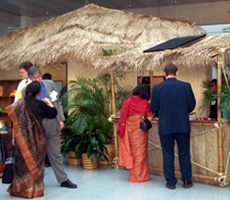
Visitors to the Solar Village, the World Bank.
|
|
|
On Monday, 4 December, the Village Power 2000
participants met in five overlapping workshops focusing on:
- micro-enterprise/introduction of technology to indigenous peoples;
- rural telecommunications and digital technologies;
- Village Power models – computer-based analysis for
rural energy development;
- solar technician training and certification; and
- long-term world energy scenarios and the role of
renewable energy.
Each workshop involved a number of expert
presentations, as well as discussion of the issues among the participants.
|
|
Workshop: Introducing Technology to Indigenous Peoples
and the Role of Micro-Enterprise
|
|
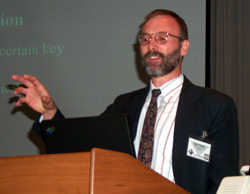
|
THE ISSUES
Speaking on affordability and income generation, David
Kittleson of NRECA stressed the need to understand the interplay
between spiritual, cultural, political, health-related and economic
aspects of the lives of people in rural communities. He said that to
succeed with rural development, poverty alleviation and
electrification, an understanding of what the people targeted want
is essential.
|
|
THE EXPERIENCE
Jagan Nath Shresta of the Nepal Solar Energy
Society spoke on the market potential of photovoltaic technology in
Nepal. He presented examples of successful implementation of solar
systems for telecommunication, water pumping, drip irrigation,
education, as well as activities generating income through provision
of services related to: rural telecommunication services; cordless
telephone systems; photocopying; and internet access. |
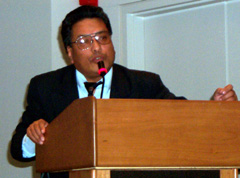
|
|
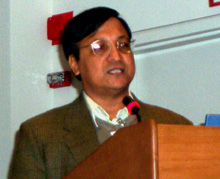
|
MODELS FOR MICRO-ENTERPRISE
DiPal Barua, of Grameen Shakti (Grameen Energy) in
Bangladesh provided a slideshow on the activities of the Grameen
Bank. The bank started as a loan system in the 1970s, and now has
2.4 million clients among the landless poor. On Grameen Shakti,
DiPal Barua highlighted its solar energy programme, which involves
local technician training and active maintenance.
|
|
|
Workshop: Rural Telecommunications & Digital Technologies
|
|
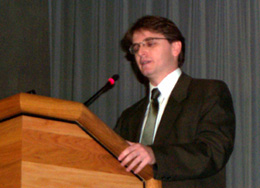
|
Overview of Telecommunications and Information
Technologies for Rural Development
Juan
Navas-Sabater, World Bank, addresses the workshop on the use of
telecommunications and information technologies in rural development.
"Rural communities are a key element for economic and social
development."
|
| Experiences
and Lessons Learned From Rural Deployment of Telecommunication and
Information Technologies
Maria
Kendro, National Telephone Cooperative Association, discusses the
role of rural telecenters. |

|
|
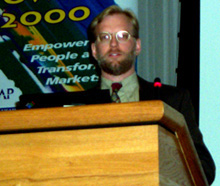
|
Remote
Power Systems for Deployment of ICT Systems in Un-electrified Rural
Areas
Charles
Hanley, Sandia National Laboratories, on off-grid power systems for
rural distance education. He spoke on considerations in the
selection of power systems and end-use equipment, and technical
assistance to implementing agencies. |
| Taking the Initiative: Examples From Different
Organizations
William
Howley, Winrock International, leads a discussion on challenges to
integrating ITC into rural development programs. He says the productive use of renewable energy is a key to rural market
strategy.
|
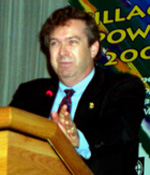
|
|
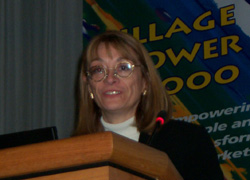
|
Discussion on the Intersection of Rural Energy and Rural
Deployment of ICT Systems
Marie-Louise Caravatti, US Department of Energy, moderates a
panel on public-private partnerships. Panelists include
representatives of the Discovery Channel Global Education Fund,
E-Bay Foundation, Lucent Technologies, SunGuard, ICSI and SolarQuest. |
|
|
Workshop: Village Power Models: Computer-based Analysis for Rural Energy Development
|
|
Doug
Danley, Orion Energy, presents Nsol, a program for sizing PV
systems. The program uses a complex mathematical algorithm to
incorporate the critical factors.
|
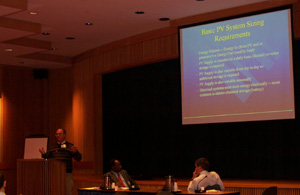
|
|
|
Workshop: Solar Technician Training & Certification
|
|
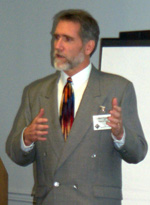
|
Mark
Fitzgerald, Institute for Sustainable Power, describes how training
and certification programs promote the quality of power
practitioners globally while creating local jobs, assisting the
finance community and improving quality and reliability in the
industry.
|
|
|
Workshop: Long-term World Energy Scenarios and the Role of Renewable Energy
|
|
Walter
Short, National Renewable Energy Laboratory, concludes that smart
policies can reduce US carbon dioxide emissions at little or no net
cost by fostering improvements in energy efficiency and encouraging
further development of wind resources.
|
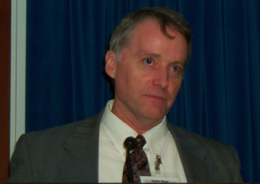
|
|













